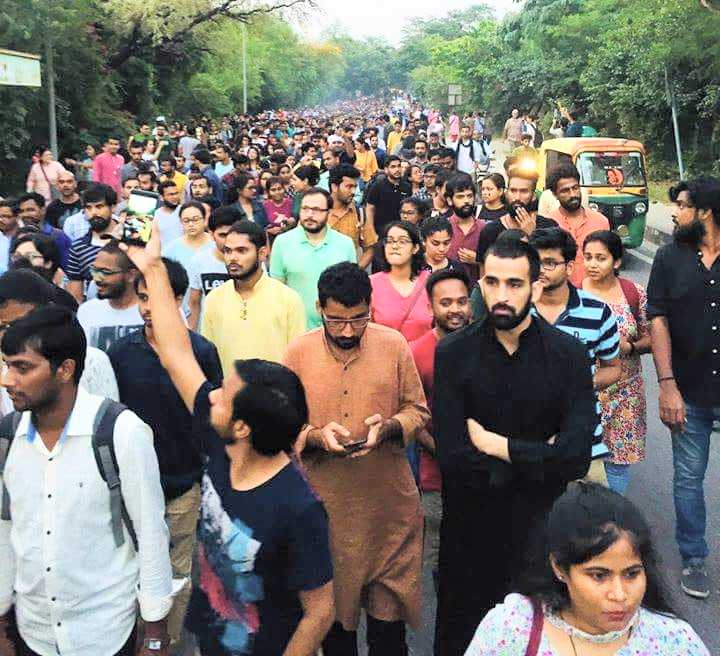JNU Fights Back And Inspires

IN JNUSU Elections 2018, JNU students administered a comprehensive rebuff to the ABVP - the campus storm-troopers of the fascist RSS, and elected the united Left panel of candidates with a huge majority. The JNU elections this year saw a record 67.8% voter turnout - indicating that the JNU student community recognised the urgent need to defend the University from relentless assaults by the Modi regime.
The Presidential candidate from the united Left panel, N Sai Balaji of AISA, polled 2,151 votes with a margin of 1,179 votes over his ABVP rival. The united Left candidates on the posts of Vice-President, General Secretary, and Joint Secretary (Sarika Chaudhary from DSF, Aejaz Ahmad Rather from SFI and Amutha Jayadeep from AISF respectively) won with similarly massive margins.
The ABVP has claimed to have won a “moral victory” by emerging on the second position - but this is a claim that is mocked by the facts. In fact, ABVP’s vote share declined by 4% since last year, and it visibly lost ground even in the Science Schools which used to be an ABVP bastion. It is clear that JNU students made the ABVP pay the due costs for its role as agents of the Vice Chancellor and the Sangh Parivar, for the mob attack on and disappearance of the student Najeeb, and for defending the pro-ABVP Professor Johri accused by 8 women students of sexual harassment.
The JNUSU mandate is not only a victory of an electoral alliance of the united Left and a united Opposition. It is the victory of the sustained fighting unity of JNU students against a united fascist nexus of the JNU VC, ABVP, RSS and the Modi Government. It is a victory of education, debate, and reason over a fascist political culture that brands all intellectual pursuit, rationality, and questions from citizens as ‘Urban Naxalism.’
In JNU, the Left unity has a powerful axis in AISA which emerged after the Soviet Collapse and grew as a vibrant, inspiring and resilient Left presence among Delhi students, withstanding the Left Front debacle in West Bengal and the setback in Tripura.
The ABVP strained every muscle to try and win JNU and distort JNU’s democratic electoral culture: they invited students to biryani parties and they arranged trips to Parliament to meet the Vice President Venkaiah Naidu. But to JNU students, the contrast between the Left and ABVP was clear. The Left activists braved huge fines and court cases for fighting the seat cuts, attacks on reservations, affirmative action policies and gender justice, and the crackdown on the right to protest. Meanwhile the ABVP leaders flaunted selfies with the JNU Vice Chancellor and the Prime Minister, and it is a former ABVP leader who is the JNU’s legal counsel in Courts, defending every illegal move by the JNU VC. The ABVP also spearheaded the campaign to brand JNU as ‘anti-national’ and ‘Urban Naxal’, and expressed regret that a shooter failed to kill JNU student activist Umar Khalid.
ABVP’s conduct during the JNUSU counting and the aftermath of the results should serve as a warning of the BJP’s conduct in and after the 2019 polls. The RSS outfits will try to win by hook or crook - and if they fail to win, they will try to demolish democracy itself.
The ABVP managed a victory in the DUSU polls marred by controversy due to faulty and suspect EVMs. In JNU, ABVP leaders physically attacked the Election Committee which comprises entirely of students and entered the counting premises in an attempt to capture the ballot boxes. Their pretext was the EC invoking the rule prohibiting entry of counting agents after the counting process had begun. This rule was invoked not only for ABVP but also for AISA - but whereas AISA which headed the Left Unity panel abided by the rule, the ABVP unleashed violence and mayhem. The ABVP violence was, in fact, triggered by the results from the Science Schools and Special Centres where the ABVP lost all but one Councillor post.
The ABVP continued to unleash violence in an attempt to derail the counting process. It was only the steadfast unity of the students who turned up in 1000s to defend the counting process, which saved the day. After the election results, the ABVP has repeatedly unleashed mob attacks on the JNUSU President Balaji, the former JNUSU President Geeta and many other Left activists. The JNU Vice Chancellor blithely tweeted about Swachh Bharat even as ABVP mobs rampaged confident of the patronage of the Administration and Delhi Police.
Later, the JNU Administration, instead of taking action against the ABVP culprits, is using the ABVCP violence as a pretext to throttle democracy on the campus, and restrict students’ mobility: including hostel curfews (hitherto foreign to JNU) and bans on protest demonstrations! The JNU community -teachers, staff, and students together defined these draconian diktats and held a massive, silent Peace March on the campus calling for peace and democracy.
JNU is no island. It is the pulse of the students and youth of India. Even as the Left swept JNU, student movements against saffronisation and the ban on questioning and dissent are ongoing in Tamil Nadu and Puducherry. In the past, similar movements have swept the campuses of BHU, Delhi University, Jadavpur, the IIT Madras, and the Hidayatullah National Law University (HNLU), Raipur. Students and youth of India are resisting the Modi regime’s attempt to replace Universities of the JNU model with the Jio and RSS Shakha model where high fees will wall out common students, where obedience and subservience to Sangh dogma will be the rule, and where the syllabus will be full of obscurantist nonsense about airplanes fuelled by donkey urine.
The whole country must stand with our Universities in these difficult times - because the struggles in the Universities are for the future of the country, its democracy and its youth.
Charu Bhawan, U-90, Shakarpur, Delhi 110092
Phone: +91-11-42785864 | +91 9717274961 E-mail: info@cpiml.org

